Man of La Mancha was one of the most popular stage musicals of its day, clocking up an impressive 2,328 performances for its original production. Countless Broadway revivals have each achieved varying levels of success, and the 2002 production was particularly popular. The show features music by Mitch Leigh and lyrics by Joe Darion, and some of its songs have become Broadway standards such as ‘The Impossible Dream’ that has been recorded by artists all over the world and translated into languages ranging from Hebrew to Japanese. The book is inspired by Cervante’s novel ‘Don Quixote’ and tells the story of a mad knight during the Spanish Inquisition.
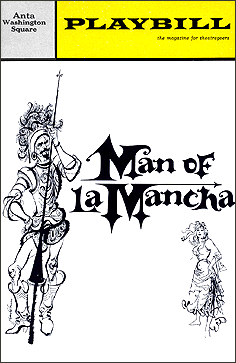
Mitch Leigh
Joe Darion
Dale Wasserman
the novel Don Quixote by Miguel De Cervantes
Albert Marre
Jack Cole
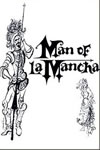
Original Broadway Production
Anta Washington Square Theatre and Martin Beck Theatre - Opened 22 Nov 1965, closed 1 Jun 1971, 2329 performances
Cast: Joan Diener, Irving Jacobson, Richard Kiley, Ray Middleton, Robert Rounseville
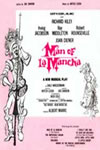
Original London Production
Piccadilly Theatre - Opened 24 Apr 1968, closed 1 Jan 1970, 253 performances
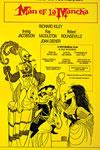
First Broadway Revival
Vivian Beaumont Theatre - Opened 22 Jun 1972, closed 1 Jan 1970, 140 performances
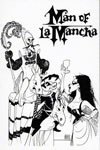
Second Broadway Revival
Palace Theatre - Opened 15 Sep 1977, closed 1 Jan 1970, 124 performances
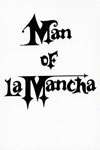
Third Broadway Revival
Marquis Theatre - Opened 24 Apr 1992, closed 1 Jan 1970, 108 performances
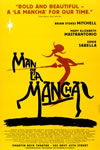
Fourth Broadway Revival
Martin Beck Theatre - Opened 5 Dec 2002, closed 1 Jan 1970, 304 performances
Cast: Mary Elizabeth Mastrantonio, Brian Stokes Mitchell, Ernie Sabella, Mark Jacoby, Don Mayo
What was your favourite production? Add your thoughts in the comments box
The show opens in Spain in the late 16th Century. Miguel de Cervantes has been thrown into prison after the Spanish Inquisition with his manservant. The other inmates threaten them and take their possessions, but they decide to set up a mock trial. If found guilty they will have to give over all of their possessions. Cervantes agrees to this except for a manuscript that he wants to preserve. He decides to deliver his defence in the form of a play, and pulls out a make up trunk to transform himself into Alonso Quijana, a Knight. He renames himself Don Quixote and sets out to find adventure with his trusty squire Sancho Panza. The pair are always in danger and under attack from Quixote’s enemy the evil Enchanter. This puts them on edge and they mistakenly attack a windmill and are defeated by it. Quixote thinks it is because he hasn’t properly been made a knight, so as he spots a castle he tells Panza to announce their arrival. The castle is really an inn, and Cervantes makes the other prisoners play the parts of serving wenchs, as well as part time prostitute Aldonza. As Quixote enters the inn, he mistakes Aldonza as the lady Dulcinea whom he swore everlasting loyalty to and serenades her.
Antonia, Quixote’s niece seeks advice from a local priest who realises that the girls are concerned with the knight’s madness and the shame it will bring the family. Antonio’s fiance is a bitter and cynical man who is upset at the prospect of having a madman in his extended family. Antonia convinces him that it would be a welcome challenge to cure him, so they decide to look after Quixote and bring him home.
Aldonza continues to be taunted by the male shepherds and is upset at her position. She questions why Sancho follows his master, and he admits to really liking him. Quixote is determined to be made a knight and asks the innkeeper to knight him. He agrees to do so if Quixote stands guard all night. That night he explains to Aldonza why he behaves the way he does, with the main song from the show, ‘The Impossible Dream’. Aldonza’s customer Pedro is furious she is late for their meeting and hits her, prompting a fight between the shepherds and Quixote who is later asked to leave the inn, but not before he is knighted by the Innkeeper. With his new title, he is determined to help the shepherds, who capture and rape Aldonza whilst Quixote remains unaware.
Don Quixote and Sancho leave the inn to join a troupe of Gypsies who steal everything from them, including their horse and donkey. They return to the inn and Quixote swears to avenge Aldonza, but she begs him to leave her alone. His mortal enemy the Enchanter arrives prompting combat. He forces him to see himself how everyone else sees him – as a fool and a madman. Cervantes tells the prisoners that his story has come to an end, but everyone is dissatisfied with the ending and force him to tell a final scene.
Quixote is lying in a coma surrounded by his friends and a priest is called as he believes himself to be dying. Aldonza rushes in to see him, but he fails to recognise her. She sings Dulcinea to him to jog his memory and he rises, asking once again to be the Man of La Mancha. Mid song, he breaks down and dies.
Cervantes is brought from the prison to face trial as the prisoners sing a reprise of ‘The Impossible Dream’ to wave him off.
Act I
- Overture
- Man Of La Mancha (I, Don Quixote)
- The Windmill
- It’s All The Same
- Dulcinea
- I’m Only Thinking Of Him
- I’m Only Thinking Of Him (Reprise)
- I Really Like Him
- What Does He Want
- The Barber’s Song
- Golden Helmet Of Mambrino
- To Each His Dulcinea (To Every Man His Dream)
- The Impossible Dream (The Quest)
- The Combat
- Little Bird, Little Bird
- The Dubbing
- Knight Of The Woeful Countenanc
- The Abduction
- Moorish Dance
- Aldonza
- The Knight Of The Mirrors
- A Little Gossip
- Dulcinea Reprise
- Impossible Dream (Reprise)/Man Of La Mancha (Reprise)
- The Psalm
- Finale (The Impossible Dream)
- Bows
- Exit Music
1966 Tony Awards: Best Musical, Best Performance by a Leading Actor, Best Direction, Best Original Score, Best Scenic Design.
